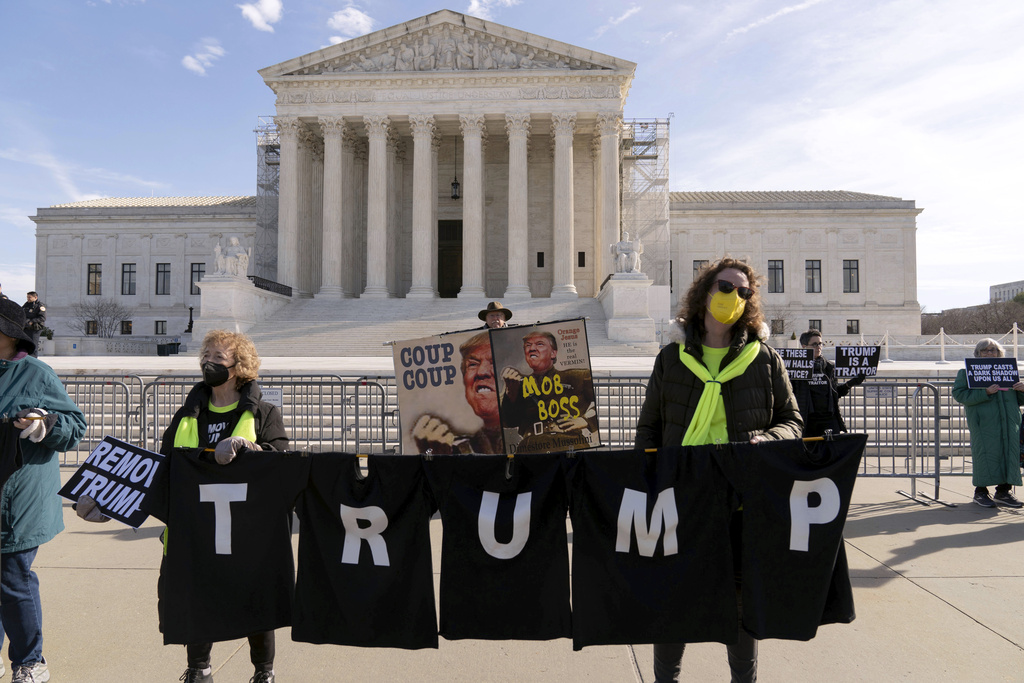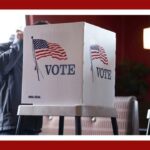

The Supreme Court ruled on Monday to keep former President Donald Trump on presidential primary ballots one day before dozens of states cast their votes in the biggest primary election of the 2024 cycle.
The case, Trump v. Anderson, arose from the Colorado Supreme Court’s 4-3 decision to remove Trump from the state’s primary ballot, citing his actions on Jan. 6, 2021, as violating the 14th Amendment. The majority opinion for the Supreme Court overturned Colorado’s decision and halted similar rulings one day ahead of Super Tuesday, when Colorado and dozens of other states will vote for their preferred primary candidate ahead of the November general election.
The high court’s opinion was per curium and held that “because the Constitution makes Congress, rather than the States, responsible for enforcing Section 3 against federal officeholders and candidates, we reverse.”
A handful of voters in Colorado who sued to keep Trump off the ballot had argued that Section 3 of the 14th Amendment, a Civil War-era constitutional provision intended to ban former officeholders who “engaged in insurrection” from election ballots, should apply to Trump because he told supporters on Jan. 6, 2021, to “fight like hell” and said that then-Vice President Mike Pence should “do the right thing” and delay the process of certifying President Joe Biden‘s victory.
While the high court has a 6-3 Republican-appointed majority, it was clear from the Feb. 8 oral arguments that each justice, regardless of which president appointed them, expressed some fears that electoral contests, and who gets to participate in them, could become unmanageable if Colorado’s top court decision was allowed to stick.
“It’ll come down to just a handful of states that are going to decide the presidential election,” Roberts said during oral arguments. “That’s a pretty daunting consequence.”
Following the Dec. 19 decision in Colorado, Maine Secretary of State Shenna Bellows said state law requires her to act on lawsuits about ballot eligibility. Bellows made the unilateral decision to remove Trump from that state’s ballot.
Trump appealed both the Colorado and Maine decisions, and the Supreme Court agreed in January to set oral arguments over the Colorado dispute for Feb. 8. In recent days, an Illinois court also removed Trump from the state’s ballot, though every decision against Trump so far has included an automatic stay pending the Supreme Court’s decision in Trump v. Anderson.
The Supreme Court’s decision in favor of Trump’s ballot access marks a major victory for the former president, who is dominating the Republican primary field against his only major opponent still in the race, former United States Ambassador to the United Nations Nikki Haley.
Trump became the overwhelming favorite for the GOP nomination after facing four criminal indictments, all of which he slams as a “witch hunt.”
The former president was initially slated to head to his first criminal trial in Washington, D.C., on four charges that he attempted to subvert the 2020 election results and deprive voters of their right to have their votes counted in a case brought by special counsel Jack Smith. U.S. District Judge Tanya Chutkan postponed the March 4 trial date due to Trump’s presidential immunity motions, which have so far failed at two lower courts.
Last week, the Supreme Court agreed to take up the dispute over whether Trump has immunity from criminal prosecution and will hear arguments over that the week of April 22, meaning his criminal trials could be pushed months later into summer or early fall depending on how quickly the high court rules on the immunity question. Legal experts anticipate it would be less likely for the justices to find Trump has absolute immunity.
CLICK HERE TO READ MORE FROM THE WASHINGTON EXAMINER
Trump is also preparing for a trial in New York to begin later this month, which revolves around reimbursements for a “hush money” payment he made to a porn star days before the 2016 presidential election. Trump has pleaded not guilty to 34 criminal counts of falsifying business records in that case.
The former president has pleaded not guilty to all 91 charges across four criminal indictments he’s facing in the run-up to the election.





